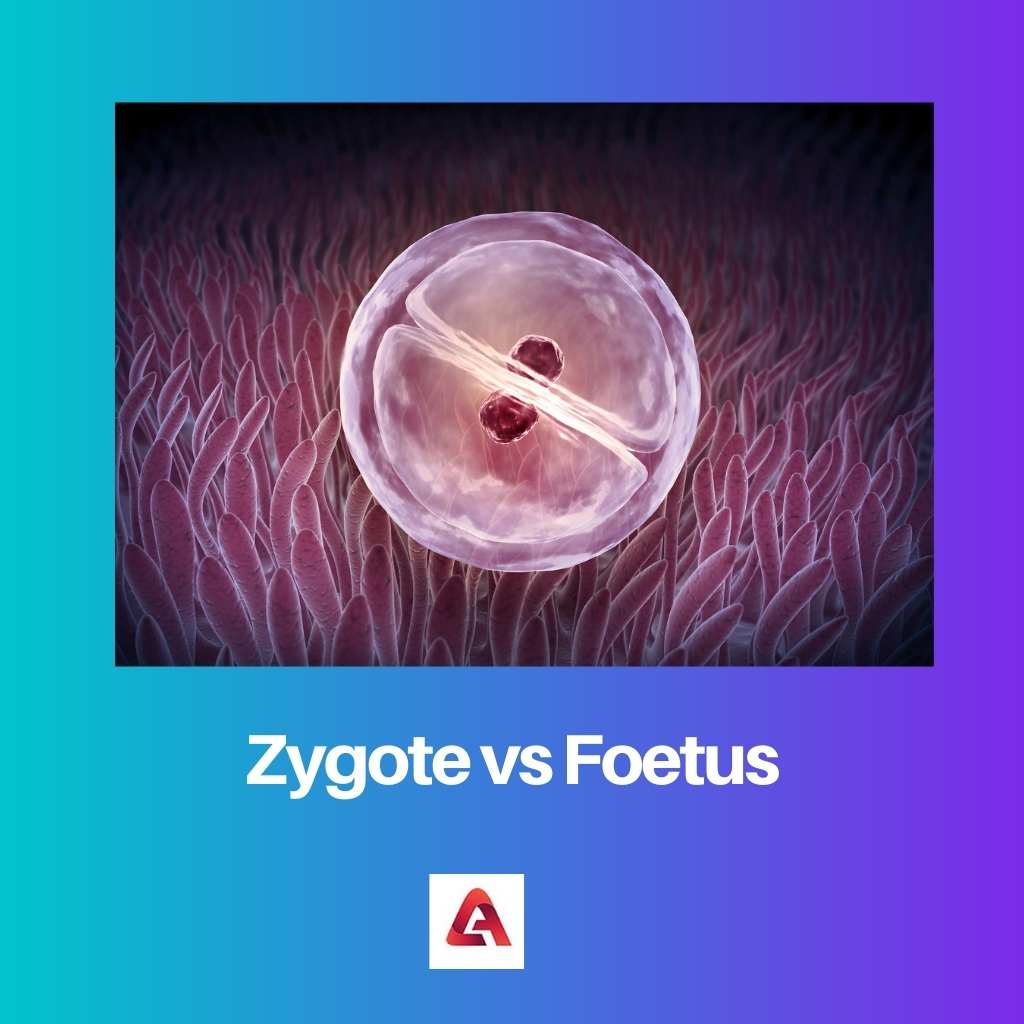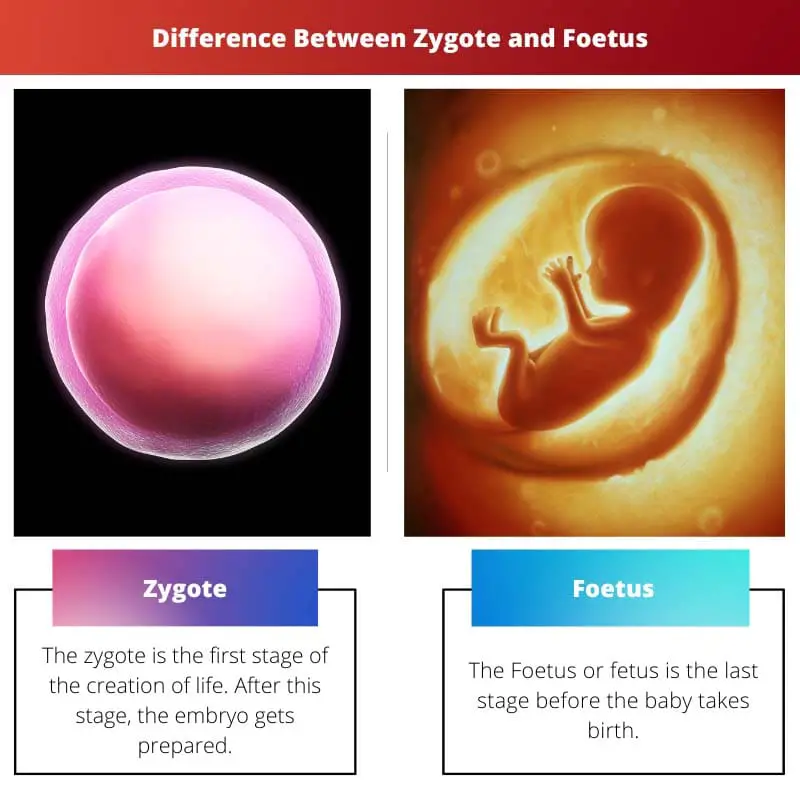The reproductive system of vertebrates includes several forms and stages. Zygote and foetus are two such terms that are related to reproduction.
Both these stages are inseparable from the formation of a child. Few similarities can be noticed between the two stages. However, they are completely separated from each other.
Key Takeaways
- A zygote forms after fertilization when a sperm cell unites with an egg cell. A foetus is a developing organism after the embryonic stage (from the ninth week of pregnancy onwards).
- The zygote is a single cell, while a foetus has various differentiated cells, tissues, and organs.
- A zygote undergoes rapid cell division (cleavage) to form an embryo, whereas a foetus grows and matures in preparation for birth.
Zygote vs Foetus
The difference between zygote and foetus is that zygote can be seen at the beginning of the pregnancy, while on the other hand, the foetus is one of the last stages of pregnancy. A zygote will reside in the fallopian tube, but a foetus will reside in the uterus.

The zygote is the first stage of the creation of life. After this stage, the embryo gets prepared. It is a single-cell stage. In humans, the zygote takes place in the fallopian tube. This process is noticeable in plants as well.
The Foetus or fetus is the last stage before the baby takes birth. This is a long stage where the formation of bones, muscles, and the brain take place. In humans, the baby starts developing into the shape of the human. A foetus lives in the uterus.
Comparison Table
| Parameters of Comparison | Zygote | Foetus |
|---|---|---|
| Cellular quality | It is unicellular. | It is multicellular. |
| Body parts | In the zygote situation, the body parts are not developed fully. | One can observe the body parts in a foetus. |
| Relation with embryo | A zygote turns into an embryo. | The embryo turns into a foetus. |
| Formation | It forms when sperm and egg join infusion. | It forms after cell division. |
| Location | It stays in the fallopian tube. | It is located in the uterus. |
What is Zygote?
The term zygote is an ancient Greek word that means to join or to yoke. A zygote is the result of the fertilization of gametes. It is a diploid cell.
When the sexual reproduction of organisms takes place, a zygote gets constructed. The zygote is regarded as the first stage of a new life. In different plants, this stage gets formed in different places.
However, in the case of humans, sperms and ova contain 23 chromosomes each. When the process of fertilization begins, all the chromosomes come together and generate 46 chromosomes, and a zygote gets structured.
Once the zygote is ready, it takes 24 hours to start the mitosis for the next stage of life, which is the embryo.
After 4 to 5 days of the zygote process, the embryo gets ready. Modern science has been able to genetically edit human zygotes. These experiments have been proven to cure inherited diseases.
In the case of plants, the zygote can be polyploid. This can only occur in gametes that are unreduced meiotically.

What is Foetus?
To depict in the simplest language, we can say an embryo turns into a foetus. It happens 8 weeks after fertilization. If you follow the medical journals, then you will find the term ‘fetus’ gets used mostly.
The fetal period of a foetus lasts till a new organism takes birth.
This stage starts from the 8th week of fertilization and lasts till the 38th to the 40th week. This new organism is the baby after birth. In this state, the embryo takes the shape of a human. However, several organs do not develop fully in this phase.
The brain and muscles of the baby develop gradually in this phase. And due to the growth, few movements and twitches can be noticed. In the 26th to 38th week, the bones get developed.
Head hairs and fingernails also developed slowly. After 38 to 40 weeks, the baby is ready to come out into the world.
As most of the baby’s growth takes place in this phase, the mother needs to be very careful about her diet. It is a high time when anomalies in development can occur.
The chances of birth defects are higher here. Lifestyle choices should be taken under the doctor’s instructions. Consuming supplements is a good way to avoid the risks.

Main Differences Between Zygote and Foetus
- A zygote is a situation that takes place in the initial stage of pregnancy, while a foetus is the part of the last stages of the pregnancy.
- A zygote is unicellular. That is, it comes with one single cell. But a foetus is multicellular.
- Zygote, being the beginning of life formation, does not start to form the body parts. Therefore the body parts are not visible. However, the foetus takes place at the end of the pregnancy, and thus the body parts are visible.
- The zygote develops itself and turns into an embryo, while on the other hand, the embryo takes the shape of a foetus gradually.
- Zygote stays in the fallopian tube while the foetus can be found in the uterus.
- To form a zygote, the amalgamation of sperm and egg needs to take place. On the other hand, the foetus will get formed only after the cell division takes place.

- https://books.google.co.in/books?hl=en&lr=&id=NiviBAAAQBAJ&oi=fnd&pg=PP1&dq=+Zygote+and+Foetus&ots=7QGY9219hS&sig=OofxW_L2V-FEKTj2CD8nxoddzs4
- https://www.sciencedirect.com/science/article/pii/S0093691X03002292
